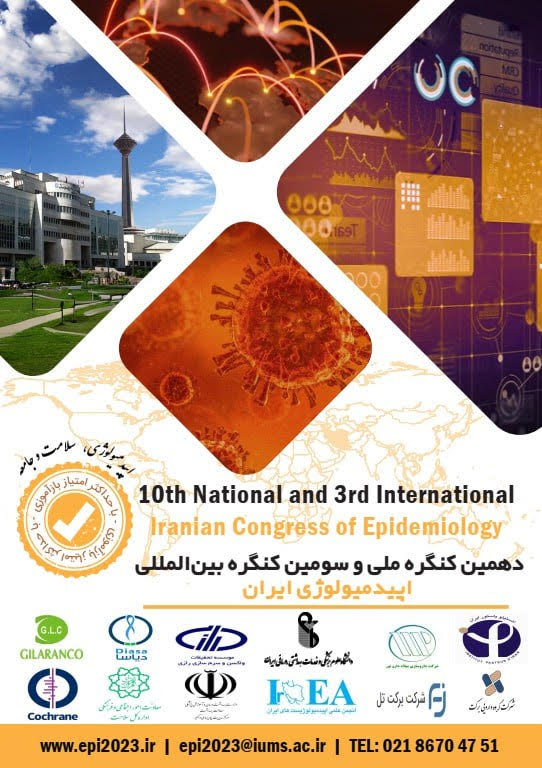
Cochrane Iran collaborated on the 10th Iranian National Epidemiology Congress, which is held in Tehran from November 29 to December 1, 2023, at the Razi Conference Hall of the Iran University of Medical Sciences. The Cochrane Iran thematic panel entitled "Secondary Studies, Cochrane Iran, and Evidence-Based Practise in Clinical Medicine and Public Health" was held on the first day of the congress, with five invited speakers presenting and Dr. Farid Najafi, Dr. Hamidreza Baradaran, Dr. Aliakbar Haghdoost, Dr. Manoochehr Karami, and Dr. Bita Mesgarpour serving as panellists.
Catherine Spencer, CEO of Cochrane, gave the opening speech of the panel. discussing future changes to Cochrane to expand the Cochrane community to increase diversity, equity, and inclusion of content and participation. In her keynote, she praised Cochrane Iran as one of the geographic groups that play a key role in the dissemination of Cochrane methods, education, and support. The video and text of her speech are available here.
The second speaker on the panel was Dr. Nizal Sarrafzadegan, director of the Cardiovascular Research Institute at the Isfahan University of Medical Sciences. She gave a speech titled "Cochrane and the process of developing clinical guidelines for acute coronary syndrome in Iran." She began her talk by discussing the different types of clinical guidelines produced by the World Health Organisation (WHO). She then noted that Iran has a history of adopting international clinical guidelines, but that this practise can be problematic if the guidelines are not adapted to the Iranian context. She argued that using clinical guidelines that are not credible in the Iranian community can lead to the use of ineffective interventions and, more importantly, can harm patients. The video of her speech is available here.
Over the past 25 years, evidence-based medicine (EBM) has transformed the practise of medicine. EBM is a process that integrates the best available evidence with clinical expertise, patient values, and circumstances. However, EBM is not perfect, and the concept is evolving in response to its critics. Many clinical studies have been conducted, analysed, and/or reported with poor methodology. In this regard, it is necessary to create strategies for developing high-quality research. In the future, as new ways of obtaining health data are introduced, the world of EBM and clinical research is likely to change; however, the ultimate goal will remain the same: improving health outcomes for patients. The other speaker on the panel was Dr. Morteza Ghojazadeh, representing Dr. Sakineh Hajebrahimi, the director of the Evidence-Based Medical Research Center at Tabriz University of Medical Sciences. His talk was titled "Evidence-Based Clinical Research”.
Dr. Manoochehr Karami, a professor at Shahid Beheshti University of Medical Sciences, was the next speaker on the panel. He presented a speech titled "Cochrane Evidence Synthesis in the Iranian Primary Health Care System." He, referring to Cochrane's efforts to offer the "Cochrane Evidence Essentials" training course for non-specialists, announced the localization of this training course by preparing simple language content and educational videos and presenting it on the website of the Office of Health Education and Promotion, Ministry of Health, Treatment and Medical Education (related news).
Dr. Mohsen Dehghani, an Assistant Professor of Epidemiology at Mashhad University of Medical Sciences, presented a speech titled "The Role of Network Meta-Analyses in Clinical and Health Decision-Making". In his talk, he discussed the concepts of network meta-analyses, how they are conducted, the trend of publication of network meta-analyses over the past 15 years internationally, and the use of network meta-analyses in knowledge translation. Then he discussed the importance of designing and defining a correct and accurate clinical question, as well as relevant healthcare questions by the research team, for making informed decisions and using the results in the clinical and health fields. He then discussed the National Institute for Health and Care Excellence (NICE) in the United Kingdom and the role of its "Decision Support Unit" in synthesising evidence for use in guidelines and publishing a set of methodological articles in the field of network meta-analysis by this office over the past 10 years. In conclusion, Dr. Dehghani referred to some examples of recently published books and articles on network meta-analysis in various health fields.
Dr. Bita Mesgarpour, Co-Director of Cochrane Iran, referred to the formation of the Cochrane Collaboration 30 years ago (1993) and its structure for producing Cochrane reviews. She also highlighted the launch of Cochrane Iran as the only Cochrane centre in the Middle East and neighbouring countries as a national achievement. She also highlighted the following successes of Cochrane Iran over its seven years of operation: the addition of Persian to the Cochrane Collaboration's main website in October 2019; the addition of Persian and the ability to search for Persian summaries of more than 5,300 Cochrane reviews in the Cochrane Library in January 2019. In her talk, Dr. Mesgarpour also discussed the significant increase in the number of views of Persian-translated Cochrane reviews in 2022 compared to 2019. She also provided a list of the most-viewed review titles and podcasts. Dr. Mesgarpour's speech was titled "The Impact of Persian Translation of Evidence: The Lived Experience of Cochrane Iran."
Dr. Ayat Ahmadi, an epidemiologist and faculty member at Tehran University of Medical Sciences, was the last speaker on the panel. His speech was titled "Designing an Interactive Platform for Assessing Health Claims with Systematic Reviews." In his talk, Dr. Ahmadi discussed the challenge of health claims and the need for scientific evaluation. He then introduced a website that has been designed and launched to evaluate these claims based on scientific evidence. On this interactively designed website, users can submit health claims published on various websites for fact-checking. The evaluation of health claims is based on systematic reviews, primarily Cochrane systematic reviews. The video of his speech is available here.
Related links
Poster introducing Cochrane Iran - November 2023
Photos of the panel and Cochrane Iran booth at the 10th National Epidemiology Congress of Iran
